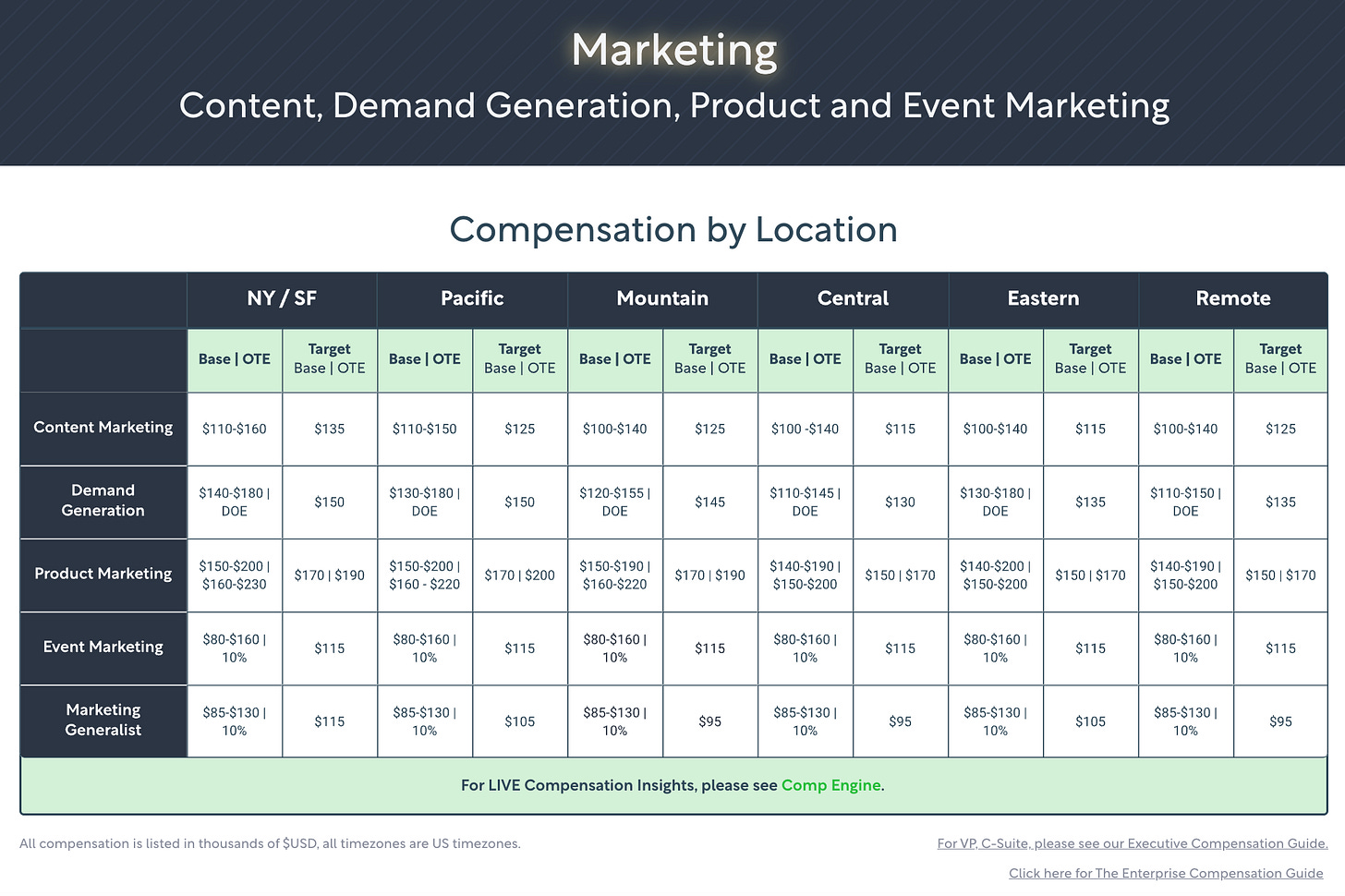The Great PMM Revival: Marketing's Swiss Army Knife is Fully Back
How Product Marketing Quietly Reclaimed the Center of GTM Strategy
A few weeks ago, I found myself at a small gathering hosted by a prominent VC firm, surrounded by seasoned CMOs from successful startups and scaling enterprises. The afternoon's conversations quickly went beyond surface-level networking, diving into nuanced discussions about the evolution of marketing leadership. It was there, amid a spirited debate about who truly owns go-to-market (GTM) strategy (marketing, sales, or product) that a powerful realization struck me:
Product Marketing Managers (PMMs) had quietly reclaimed their rightful place at the center of marketing leadership, owning GTM strategy.1

I wanted to share my reflections of the evolution of marketing leadership from my own experience, market observations, and conversations with founders who are entering scale-up mode.
The Branding Era: Captivating Audiences through Storytelling
In the mid-2000s, marketing leadership was synonymous with storytelling. When I graduated from UC Berkeley, my brain was packed full of iconic marketing campaigns like Apple’s rebellious ‘Think Different’ and Nike’s edgy Charles Barkley ‘I am not a role model’ ads. At the time, I genuinely believed that great marketing meant making people feel something so strongly they’d tattoo your logo somewhere. We were taught to strive for deep emotional connections and the growth would flow from that foundation.
At Electronic Arts, early in my career, product marketing was king. PMMs owned everything: brand strategy, voice of the customer, positioning frameworks, forecasts, and comprehensive go-to-market plans. We crafted sharp, impactful positioning statements known internally as "The X," a concise, powerful expression of exactly what our products were, how they differed, and why anyone should care. It was rigorous, nuanced, and fundamentally brand-driven.
This isn’t to say that the “Product” aspect on PMM was light. On the contrary, we also spent hours each day in the development “pits” chasing down designers, producers, engineers—anyone who would listen— to provide our gathering of customer insights that might inform the game we were building. That was marketing leadership: strategic, cross-functional, GM-like.
But the digital wave was coming, and with it, a profound shift.
The Digital Shift: Data Takes Center Stage
In the early 2010s, the marketing landscape underwent a seismic shift. The rise of digital platforms transformed the Chief Marketing Officer's (CMO) role from a brand storyteller to a data-driven strategist. The 2011 Spencer Stuart report highlighted this evolution, noting that "a host of factors, largely technology-enabled, are making the life of the CMO increasingly complex."
This complexity arose from the transition to highly targeted customer outreach, the emergence of online aggregators, and the growing importance of direct distribution channels. CMOs were now expected to mine and analyze data to drive pricing and revenue management, significantly impacting operational performance. The marketing function's influence expanded beyond traditional boundaries, demanding a new set of skills and a shift in mindset.
During this period, Product Marketing Managers (PMMs), who sat somewhere between the brand-performance continuum, were often sidelined. Almost overnight, we watched our roles get sliced up and handed out to specialists in SEO, performance marketing, growth hacking, brand, and content creation. It was like a bunch of role-player athletes showing up to gameday without a head coach. Suddenly, we were left wondering, ‘What exactly is my role here now?’ In that hyper-specialized moment, PMMs spent a lot of time trying to figure out where their seat at the table had gone; or if there even was a table anymore.
Their roles, traditionally associated with creative branding and messaging, were perceived as less critical in an environment that prioritized measurable results and rapid growth. The emphasis was on performance marketing, with a focus on user acquisition, engagement, and conversion. PMMs, seen as the custodians of brand and positioning, were viewed as non-essential in the data-centric marketing paradigm.
This shift led to a reevaluation of marketing leadership. The modern CMO was expected to have a strong background in analytics and performance marketing, often at the expense of traditional product marketing expertise. The PMM role, once central to marketing strategy, became a "nice to have" rather than a necessity. This realignment reflected the industry's focus on quantifiable outcomes and the growing importance of digital channels.
In retrospect, I get why these assumptions were made and it made all the sense in the world to prioritize marketing leaders that could seek out and pull those customers in a quantifiable manner. The generalist positioning around product marketing didn’t align with the transformation happening in digital spaces.
Confusion Around the PMM Role
Let’s discuss my understanding of what it means to be a product marketing leader, standing independent of both brand and performance marketing. Your views may differ from mine; perhaps product marketing feels more like a B2B construct vs. B2C. In organizational design, deciding whether product marketing is necessary is a classic case of “what problem are we solving for?” Ultimately, someone needs to be accountable for distilling the customer’s needs and communicating those to any team that plans to distribute something of value back to the market. That’s where it starts.
But despite the comeback, ‘Product Marketing’ remains hilariously misunderstood. It’s right up there with ‘Growth Marketer’ in the running for ‘Most Ambiguous Job Title Ever.’ I’ve seen founders look for PMMs and end up wanting someone who can simultaneously launch a content strategy, set pricing, and debug code in the same day. As a founder myself, I deeply feel that importance. But I’m here to tell you that approach isn’t very sustainable.
PMMs frequently find themselves tasked with jumping around a broad marketing playbook. Some organizations mistakenly expect their PMMs to function simultaneously as technical product managers, sales managers, or multi-channel marketing experts. Unsurprisingly, this rarely works out well, as it dilutes their core strengths and effectiveness. They should have a broad skillset, but their work requires prioritization and cross-functional coordination vs. ownership of every specialization.
Another frequent challenge is the heavy reliance on market research inherent in the PMM role. Companies appreciate the insights PMMs bring but rarely have the patience required for comprehensive research processes. To address this, companies increasingly prioritize candidates with relevant vertical and product experience to expedite the learning curve and accelerate outcomes.
That means that PMM leaders need to master the strategic know-how of many marketing disciplines while being able to distill efficient insights about a product’s fit in the market. It takes years to build these different skills into strong capabilities. Those who can are incredibly powerful chess pieces in an organization.
The Return of Product Marketing Leadership
The good news here is that companies are realizing that generalist, cross-functional team leadership is needed in this world of specialized GTM channels. There's been a resurgence in the value placed on Product Marketing Managers. Companies have recognized that PMMs possess a unique blend of skills crucial for navigating today's complex marketing landscape and it shows in the talent markets. According to the 2025 Betts Compensation Guide, product marketers are earning anywhere from 15-60% premium on total comp when compared to other marketing specialties.

It certainly feels like the pendulum in marketing leadership has swung back towards product marketing in this era. So what’s changed? A few things:
Commoditized performance marketing: playbooks are optimized across most mature digital channels. Marketers will find a ceiling on efficient growth here faster than the emergence of new media platforms / channels.
Customer optionality: In a hyper-competitive environment, alignment across marketing and product is super important. These two functions must collaborate closely to understand and build for customer needs. They also should agree on how their product and positioning are differentiated from other options in the market.
Focus on full funnel growth: Along with the rise of the Growth function, the requirements for marketing leadership increasingly demand a full funnel, revenue accountable view of the business. A strategic leader needs to understand and prioritize different parts of the funnel, from awareness through monetization and retention. It’s simply no longer good enough for marketing to close their laptop after demand gen teams reach their MQL targets.
Cross-functional alignment: PMMs have traditionally been the “glue” across many functions. Their market knowledge and deep understanding of target customers uniquely positions them to direct go-to-market strategy. Coordinating cross-functional teams across an organization dismantles organizational silos to create customer-centricity, effectively driving the business. In some orgs, this part of product marketing has been syphoned to operations roles like BizOps, program management, or marketing ops.
tl;dr: PMMs aren’t just the ‘positioning folks’ anymore. They’re strategic Swiss Army knives, decoding customer journeys, rallying internal teams around shared goals, and making sure every customer interaction actually makes sense. In other words, they’re finally getting the credit they deserve.
Looking back, I wasn’t expecting this to be the primary takeaway from the CMO event I attended. I knew there would be a heavy emphasis on the role of marketing alongside the cresting wave of AI. But every topic seemed to come back to the strategic importance of collaboration with other functions, agile adaptability in uncertain times, and bringing creativity back to the forefront of marketing. These are the core competencies of a great product marketer.
In essence, PMMs are not just marketers; they are strategic leaders who understand product intricacies, market dynamics, and customer expectations. They leverage data-driven insights to build conviction and bring the company together. Their holistic approach to GTM strategies makes invaluable and well-suited for GM, CMO, CRO, and CEO roles.
I'd love your thoughts: How do you view the role of product marketing in shaping GTM strategies in your organization? What are the competencies you are looking for the most in your marketing leaders?
Let’s continue the conversation in the comments below.
For context, I define a PMM primarily as someone who has P&L responsibility, accountable for voice of the customer, and alignment driver across GTM cross-functional team.



